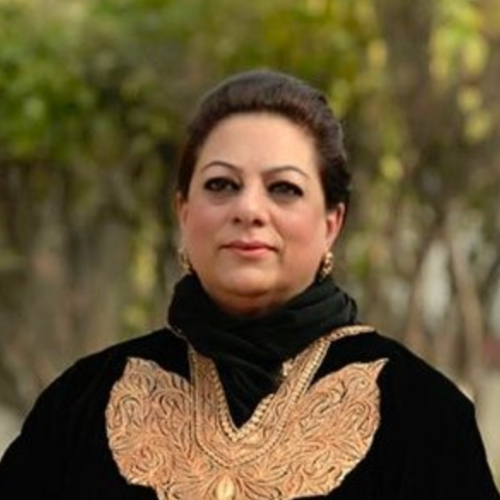How do we create more opportunities for women of faith to become mediators?
This interview was conducted with Ezabir Ali, a woman faith-based mediator from Kashmir.
Why did you become a mediator?
I chose to be a mediator, and use my mediation skills to help people, especially women, to empower them to challenge the dominant narrative, of seeing women as victims and not as survivors in Kashmir and work to restore their basic rights. My introduction to mediation practice goes back to more than 28 years, this year, when I initially started my work on the psycho social healing and economic development of women in Jammu and Kashmir, as they had been badly affected by the conflict. I travelled extensively across the length and breadth of Kashmir, documenting the impact, while holding many women engagement meetings. The intense sharing’s in these closed group meetings prompted me to move beyond the use of facts and figures to focus on understanding what was going on in their lives, what were their needs, interests and concerns. I established a SAMANBAL, a safe inclusive story-telling space for women, across all the divides of Jammu, Kashmir and Ladakh who had become deeply divided and polarized over time to dialogue and build their broken relationships. I facilitated various sessions not just for women but also those that were inclusive of men. I used various tools and feminist facilitation skills, keeping in mind the common values that are present in many religions, such as love and respect for human dignity, to build bridges and work towards peace for all.
Why do you believe women and young women, especially women of faith, are not engaged more often in mediation processes?
It is a known fact that women are often excluded from formal peace and mediation processes; though women’s participation in conflict prevention and resolution can improve outcomes before, during and after conflict but unfortunately women have to struggle for their inclusion. I feel the main reason is the basic structural exclusion, women face from decision-making positions. Women have been systematically excluded from political leaderships and peace processes throughout history and this exclusion continues despite decades of policy on the subject as does the neglect of gender considerations in peace and mediation processes, all over the globe. The non-existence of any quota on gender inclusion, from negotiation delegations, to consultative and implementation bodies, or any constitutional commissions also makes this difficult to achieve.
‘Women bring gendered perspectives to mediation that are necessary to address gendered structures of inequality that perpetuate violence against women, as such women mediators can bring in this unique expertise in expert Commissions, as observers, insiders or as facilitators.’
Why do communities need to engage women of faith mediators?
Women of faith mediators can be central figures in a conflict, either because the conflict content concerns them directly or because they are agents of change, as such analyzing their role in conflict is a must.
How do we create more opportunities for women of faith to become mediators?
It is often suggested that women mediators bring different ‘soft’ skills to mediation and that they will be catalysts to women’s empowerment. Keeping this in view, the respective Governments should bring out some legislature and increase the number of women mediators in the country, especially for dispute resolution. There is very little data available on the connection of including women and religious actors in mediation. Mediators must as such be encouraged to including female religious actors in their respective mediation processes with the public. Recording and sharing lessons learned will hopefully help further develop good practice on the important link between religion, women and mediation.

About Ezabir Ali
Ezabir Ali is a Commonwealth professional and Harvard Alumnae from Kashmir. In the course of her 28-year career, she has served in the public and non-profit sectors in Jammu and Kashmir. For more than two decades, she has done extensive work on the psycho-social healing and economic development of women in Kashmir. Ezabir Ali has documented the impact of conflict on the lives of women in Jammu and Kashmir, including those living along the Line of Control (LoC), Ezabir’s work on the issues affecting half-widows has led to increased support and understanding amongst religious leaders, hard-to-engage groups and society at large, on the rights of women in general and half-widows in particular. Her initial contact with the Ulema (religious leaders) on this issue, led to a ‘fatwa’ being passed to address the ambiguity surrounding the number of years a half-widow must wait before considering remarrying if she wishes. More recently, she has made considerable progress in advocating for the property rights of half-widows. Ezabir Ali has also been working on improving the relationship between polarised communities in Kashmir, using dialogue, active listening and effective mediation as a skill. She has set up SAMANBAL, which is a “safe inclusive story-telling spaces” for women across all divides to dialogue and build solidarity to improve relationships amongst women of three regions, who were deeply divided over a lengthy period of time. Ezabir Ali is the Founder/Secretary of EHSAAS, a Non-Governmental Policy group working on advocacy on rights of women in Jammu and Kashmir State. She is also Board Member, Jammu and Kashmir Voluntary Health & Development Association and Consultant/Partner Conciliation Resources, Gender Project, South Asia. Ezabir Ali completed her basic education in Nyeri, East Africa. She holds a bachelor’s degree in psychology and education from Kashmir, a Master’s in English from Kashmir University and a Master’s in Development Studies from the University of East Anglia, Norwich.
